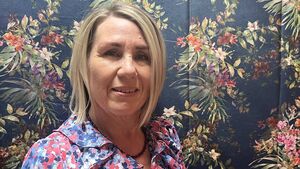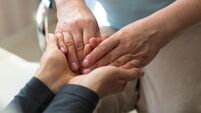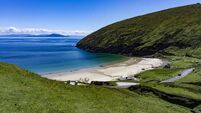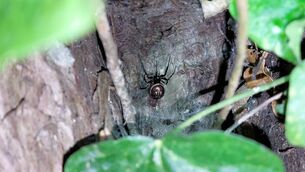'I had to give up my son on the day he was born'

Islandeady native Mary Moylett offers support to women who had to give up their children for adoption.
Like a lot of people who participate in voluntary organisations or support groups, Maria Moylett has found herself involved in helping birth mothers who had their children adopted because of her own experience.
Maria gave birth to her son in 1977 when she was aged 17 and he was immediately taken from her for adoption. That experience has taken Maria on a journey in her life that was not easy at times but has led her to meeting her son and helping other women who find themselves in the same position to feel as supported as they can. Maria feels that by recounting her story when she can, other women will come forward and start their own journeys.
Maria, thanks for talking to me, tell me a little bit about yourself?
I'm from Islandeady, between Castlebar and Westport. I had a very busy teenage life. I was involved with Camogie and then went on to play Ladies Football. I was very involved in sport through my school in Castlebar. I left school when I was 15 and went working full time in Caffola's Restaurant. I fell pregnant at the age of 17 and I had my baby son in July of 1977.
What was it like to be pregnant, aged 17, in the late 1970s?
There was a lot of fear. I thought I was the the only girl this had happened to, something most of us mothers who had their babies adopted experience - they think they're the only one it's happened to until they come into a support group.
I was never asked what did I want. It was just arranged for me to be go and live with a lady who my mother knew in Galway. My parents brought me to her house in April and my son was born in July. Those few months seemed like an eternity.
Did you know what was going to happen when your son was born, Maria?
There was no supports forthcoming, there was nobody talking to me. Nobody came to me and told me there is a way of keeping your son. I relinquished my son. I would have kept my son because I had helped to rear the rest of my family, being the oldest of seven, but I was not given any choices. It was just all arranged.
"I fought to hold my son for one minute. And then I spent the whole time in the corridor wondering, 'should I take him with me and just go?' And it was like time stood still. If I take him, what will happen? If I don't take him, where is he going to go? Because you weren't told these things. So it was late in the evening when the lady came and picked me up, and there was no more talk about it. It was like nothing had happened.
Where did life take you then Maria?
My son was born in July. And then the lady who I was staying with got me work in Eyre Square - in Eyre House. So I started waitressing there and I loved it. And then I moved to doing different jobs around the place. I'm like a rolling stone. You put it out of your mind as best you can, but it's niggling you all the time. His birthday was July 13th and mine was July 27th. No mother forgets their baby's birthday and you wonder where they are and what they're doing.
So my marriage wasn't great at the time, and I had four children in my marriage, and I went to seek counselling. The counsellor got me talking about myself going back to when I was a young girl, and I was telling them all about how active I was and involved in things and happy, and life was just really good. And I told him that when I was 17, I had a baby boy. He told me that you are grieving. None of us knew this because we didn't have a death. So when he named it my whole body reacted to it. And then he asked me, after a lot of conversation, would I like help from him to find my son.
I just couldn't believe this because I had whispered in my son's ear for that minute when I held him that I would come and find him. And I did try when he was 13. And his adoptive mum, she was going through cancer at the time. It wasn't approached properly. And a letter came back to say he thought I was coming to take him away. That's the way it came across to him. He was only 13.
At that point, I decided to leave it until he was older. So I was one of seven mothers who came together. It was the first time ever in Merlin Park and there was a wonderful social worker there called Anne, and she was doing tracing as well, and we became part of the first register. It took her no time to find where my son was. And yes, he was willing for contact. He was one of four children adopted into this household, and they were all told when they were old enough to understand that they were adopted, and if they wanted to go ahead and find out about their medical background by finding their mother, then go ahead. When he was 18, we started writing. We were writing to each other for a few years. It was unbelievable. The excitement when the letter would come.
So when did you meet?
We met when he was 18. We met with his adoptive parents, and I brought my mother along, and I had a very good friend of mine with me and a social worker. When we met, his adoptive parents were absolutely beautiful. They thanked me for the gift of my son. That was hard. But seeing him, it was unreal. After that meeting, when we all went our separate ways, my whole body just went into total shock. I didn't know what was happening to me. It took a while to come around from that. And then, of course, the excitement, then with the fact that we had met and the what ifs and where do we go from here?
In 2007, I started making calls. I needed to find somebody I could talk to about this. I needed to try and find a support group. The health service passed me onto Danú Birth Mothers Group in Sligo. This group met in the Family Resource Centre in Sligo. So I said I'll make my way to Sligo. I remember my first time going through the door and meeting everybody, and it was just a cup of tea and a few biscuits and talking if you wanted to, or you could just sit there and listen. You go very deep, it's very emotional because it's the first time that you're actually talking to another mother who has gone through it too. They've gone on their own journey. The one similarity we all have is we couldn't keep our babies.
You're very involved in Danú yourself now and feel passionate about getting support ofr women who find themselves in a similar position to you.
There's lots of supports. I'm involved with Barnardos now as well. I am due to tell part of my story that will be recorded and put up on their website. I'm here to give that support one-to-one, if that's what they would like. Just make the call. You hear the voice the first time, you know, I'm the same as you. If you decide to make the call to Sheila and Liz, who run the Danú group, you will find that very warm, embracing response. You can talk in confidence, and nothing comes outside that room. Everything is left there until we return again and it's the support of the different stages that the different mothers are going through in their journey and finding their son and daughter, or if they have found them, the different walls they're coming up against, how they need to approach it or what they need to do to make it different, because we don't have any control on this.
We only have control on ourselves. And it's entirely up to our sons and daughters. They are the ones who drive the car and change the gears. It can go up and it can go down and you think you're making headway and you could be thrown right back nearly to the early stages again because we have to remember that the children have emotions and feelings and trauma. What we're feeling as individuals, they're feeling also. And they've been reared by a mum and a dad who have looked after them and nourished them and cared for them. They will always be loyal to those parents and we have to accept that. That's one of the big things that adopted children would fear is upsetting their mum and dad who have reared them. I do feel for the adoptee because they're caught in the middle.
What drives you to want to help people, Maria?
Because I know how I felt. It felt like I was in a straitjacket for a long, long time because who do you talk about this to? And until you find that woman is going to sit across from you and, you know, she has gone through the same as you and didn't get any support to keep her baby. I know how that felt.
You mentioned there are supports out there, Maria?
Absolutely - reach out. They are there to help. Danú is based in the Family Resource Centre in Sligo and you can contact Elizabeth King there on 087-9143646 or Aileen Gallagher, Social Work with Tusla on 087-6624762, and people are very welcome to contact me directly as well on 087-7555508.





